India and China have agreed to resume direct air services after nearly five years, the Indian Ministry of External Affairs said on Monday, signaling a thaw in relations between the neighbors after a deadly 2020 military clash on their disputed Himalayan border.
Both sides are to negotiate a framework on the flights in a meeting that would be held at an “early date,” the ministry said after a meeting between India’s top diplomat and Chinese Minister of Foreign Affairs Wang Yi (王毅).
The Chinese foreign ministry yesterday confirmed the announcement, adding that another meeting between officials at the vice ministerial level agreed to facilitate the exchange of journalists between the two countries.
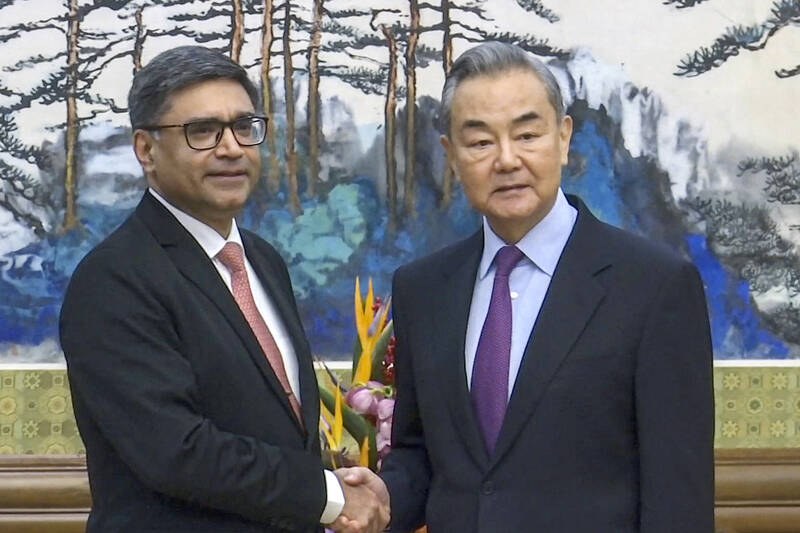
Photo: Phoenix TV via APTN
Tensions soured between the two nations after the 2020 clash, after which India made it difficult for Chinese companies to invest in the country, banned hundreds of popular apps and severed passenger routes, although direct cargo flights continued to operate between the countries.
Relations have improved over the past four months with several high-level meetings, including talks between Chinese President Xi Jinping (習近平) and Indian Prime Minister Narendra Modi in Russia in October.
On Monday, Wang Yi told Indian Foreign Secretary Vikram Misri in Beijing that the two countries should work in the same direction, explore more substantive measures and commit to mutual understanding.
“Specific concerns in the economic and trade areas were discussed with a view to resolving these issues and promoting long-term policy transparency and predictability,” the Indian foreign ministry statement said.
Their meeting was the latest between the two Asian powers following a milestone agreement in October seeking to ease friction along their frontier.
Reuters reported in June that China’s government and airlines had asked India’s civil aviation authorities to re-establish direct air links, but New Delhi resisted as the border dispute continued to weigh on ties.
In October, two Indian government sources told Reuters that New Delhi would consider reopening the skies and launch fast-tracking visa approvals.
Both nations have also agreed to resume dialogue for functional exchanges step by step and with an early meeting of the India-China Expert Level Mechanism, India’s foreign ministry said.
China and India should commit to “mutual support and mutual achievement” rather than “suspicion” and “alienation,” Wang said during the two officials’ meeting, according to the Chinese foreign ministry’s readout.
However, just as relations began stabilizing, China’s approval of the construction of a hydropower dam in Tibet, in the lower reaches of the Yarlung Zangbo river, raised eyebrows in India.
Chinese officials said that hydropower projects in Tibet would not have a major impact on the environment or on downstream water supplies, but India and Bangladesh have nevertheless raised concerns about the dam.
The dam, largest of its kind in the world, with an estimated capacity of 300 billion kilowatt-hours of electricity annually, would be located on the river that flows into India as the Brahmaputra, a key water resource for millions.
India has urged China to be transparent and consultative in its plans, underscoring that interests of downstream states not be harmed.
China said during the vice ministerial meeting on Monday that both sides had agreed to continue cooperation on “cross-border rivers” and work to hold a new round of meetings on this matter at an early date, a statement published on the Chinese foreign ministry’s Web site says.
Moreover, China and India agreed to push for the resumption of pilgrimages by Indian pilgrims to Tibet’s sacred mountains and lakes in 2025, the ministry said.
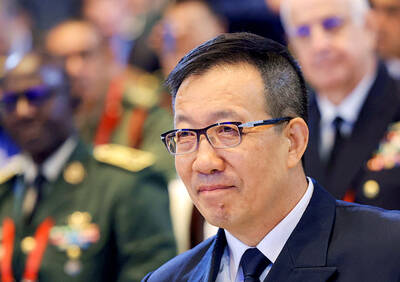
BEIJING FORUM: ‘So-called freedom of navigation advocated by certain countries outside the region challenges the norms of international relations,’ the minister said Chinese Minister of National Defense Dong Jun (董軍) yesterday denounced “hegemonic logic and acts of bullying” during remarks at a Beijing forum that were full of thinly veiled references to the US. Organizers said that about 1,800 representatives from 100 countries, including political, military and academic leaders, were in Beijing for the Xiangshan Forum. The three-day event comes as China presents itself as a mediator of fraught global issues including the wars in Ukraine and Gaza. Addressing attendees at the opening ceremony, Dong warned of “new threats and challenges” now facing world peace. “While the themes of the times — peace and development —
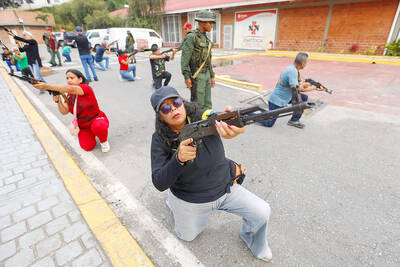
Venezuela on Saturday organized a day of military training for civilians in response to the US deployment in the Caribbean, and amid new threats from US President Donald Trump. About a month ago, Washington deployed warships to international waters off Venezuela’s coast, backed by F-35 jets sent to Puerto Rico in what it calls an anti-drug and anti-terrorism operation. Venezuelan Minister of Defense Vladimir Padrino Lopez has accused Washington of waging “undeclared war” in the Caribbean, after US strikes killed over a dozen alleged drug traffickers off his country’s coast. Caracas also accused the US of seeking regime change, and
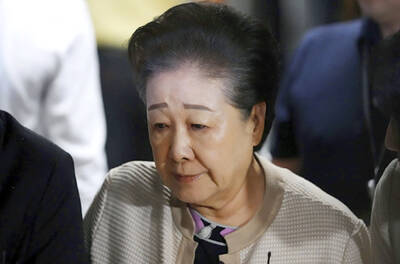
BRIBERY ALLEGATIONS: A prosecutor said they considered the risk of Hak-ja Han tampering with evidence to be very high, which led them to seek the warrant South Korean prosecutors yesterday requested an arrest warrant for the leader of the Unification Church, Hak-ja Han, on allegations of bribery linked to the country’s former first lady and incitement to destroy evidence. The move came a day after the 82-year-old was questioned over her alleged role in bribing former first lady Kim Keon-hee and a lawmaker. Founded in 1954 by her late husband, Sun Myung Moon, the Unification Church has long been the subject of controversy and criticism, with its teachings centered on Moon’s role as the “second coming” and its mass weddings. Followers are derisively referred to as “Moonies.” However, the church’s
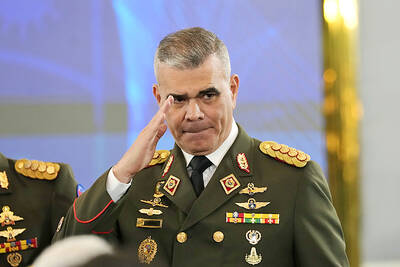
‘MURDER’: The US has not provided proof that boats it has struck were trafficking drugs, and a Venezuelan official said it was a crime against humanity that must be investigated Venezuela on Friday accused the US of waging an “undeclared war” in the Caribbean and called for a UN probe of US strikes that have killed more than a dozen alleged drug traffickers on boats over the past few weeks. Washington has deployed warships to international waters off Venezuela’s coast, backed by F-35s sent to Puerto Rico in what it calls an anti-drug operation. “It is an undeclared war, and you can already see how people, whether or not they are drug traffickers, have been executed in the Caribbean Sea. Executed without the right to a defense,” Venezuelan Minister of Defense Vladimir